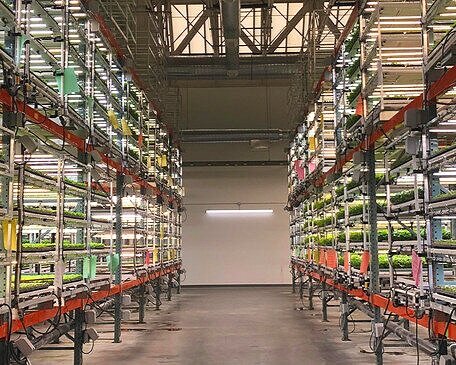After The Chaos of 2020, Will Indoor Farming Be In Our Future?
VANCOUVER, Wash. — The year 2020 has forced a number of disruptions to our daily lives, so what if we have more years like it in the future? How will we make sure our communities can survive by getting vital resources, like food?
The answer may be growing inside an old Hewlett Packard plant at the Vancouver Tech Campus in Washington.
Forward Greens is probably not what you picture when you think “farm”: vertical floor to ceiling stacks of planters filled with microgreens and baby greens, growing under LED lights
Forward Greens, Vancouver, Wash.
“Rather than growing out in an outdoor field, we’re growing up,” says Forward Greens CEO and Founder, Ken Kaneko. “We’re able to control the temperature, the humidity, the airflow, as well as the lighting,” he says.
From arugula to kale to broccoli, everything growing inside this urban, indoor farm wouldn’t be growing outside on a chilly November day in the Pacific Northwest.
From start to finish, the whole process of farming is essentially done in one room. In just a week or two, the greens are on their way to grocery stores in Portland, Vancouver, and Seattle.
Kaneko, who had worked for Intel and more recently, Apple, founded Forward Greens in 2017 after a trip to Japan. There, he stumbled upon his first vertical farm.
“I thought, ‘man, it would be great if I can bring this back to the Pacific Northwest and essentially do it better, cheaper, and more efficiently,'” said Kaneko.
Kaneko says Forward Greens never uses any pesticides, fungicides or herbicides and it uses 95% less water and 99% less land than traditional outdoor farming. But, he says, it uses a lot of energy to power the lights.
“Any engineering problem has a balance of cost, time, environmental impact, but the whole mission of this business is to balance those in a positive way towards the environment,” Kaneko said.
So could this be the farming of the future?
OSU Professor of Horticulture, Gail Langellotto, is pretty certain that it’s not. “In the near future, I can’t imagine a future where only agriculture is indoor agriculture,” she says, pointing to the high start-up costs, the higher cost of labor, and the expensive and taxing energy use.
She says traditional, outdoor farming will be difficult to replace because of the efficiency, precision and scale the industry has mastered and is constantly improving.
But Langellotto adds that if we have more years like 2020, with the pandemic and destructive wildfires on top of climate change, indoor farming will be an asset. She says urban farming is robust to disruptions in the local food system.
“If there are some supply and transport issues that delay or limit the amount of food that can be brought into urban areas from more rural, further out regions, then you already have an urban food production system in the proximity of where the majority of people live,” Langellotto said.
Kaneko is encouraged by the fact that urban farms can be a huge asset, saying, “we don’t know what’s going to happen with respect to the wildfires, the pandemic, the climate, so we’re able to provide local and sustainable food regardless of all those parameters.”
And that may be why Kaneko says demand for indoor farms is increasing. In fact, he’s expanding and doubling production at the Vancouver location in the next couple months. But he’s looking even further ahead to an even brighter future.
He hopes to put a Forward Greens in every metropolitan area, so we don’t fall to the fate of those HP printers that used to be built where his plants now grow.
KATU2 ABC Forward Greens
by Wesleigh Ogle, Thursday, December 3rd 2020
Published by Dani Kliegerman, iGrow News





